(完整word版)现代大学英语精读5 课文翻译 1-11课
现代大学英语精读5

现代大学英语精读5第一课where do we go from here?Ⅰ解释词语1.manhood (人格) the state of being a man2.white lie(善意的谎言)harmless or trivial lie,i e , one told in order to avoid hurting somebody3.black sheep(害群之马)person regarded as a disgrace or a failure by other members in his family or group4.to upset(打败)to defeat5.affirmation(证实)stating something as truth firmly and forcefully6.to strain(竭尽全力)to make the greatest possible effort7.off base(误认)mistaken8.a want of(缺少)lack of9.ringing cry(战斗口号)rallying callⅡ英译英1.It is not a easy job to educate those people who have been taught for over centuries that they were inferior and of no importance to see that they are humans the same as other people.2.Just when black people break the mental shacles imposed on them by white supremacists, if you really respect yourself, thinking that you are a man, equal to anyone else, you will be able to take part in the struggleagainst racial discrimination.3.The liberation of mind can only be achieved by Negro themslves. Only when he is fully conviced that he is a man and is not inferior to anyone else, he can throw off the manacles of self-abnegation and become free.4.Power in the best form of function is carrying out of the demands of justice with love, and justice in the best form of function is overcoming everything standing in the way of love with power.5.At that time, the way to evaluate how capable and resourcefull a person was to see how much money he had made.6.A person was poor because he was lazy and not hard-working and lacked a sense of right and wrong.7.This kind of work cannot be done by slaves who work bacause the work has to be done, bacause they are forced to work by slave-driver or because they need to work in order to fed themselves and clothed.8.When the unfair practice of judging human value by the amount of money a person has his done away with.9.Those who habour hate in their hearts cannot grasp the teachings of God. Only those who have love can enjoy the ultimate happiness in the heaven.10.Let us be dissatisfied until America no longer only talk about racial equality but is unwilling or reluctant to take actions to end such evil practice as racial discrimination.Ⅲ英译汉1.善意的谎言总好过恶意的谎言。
(完整word版)现代大学英语精读5课文翻译1-11课
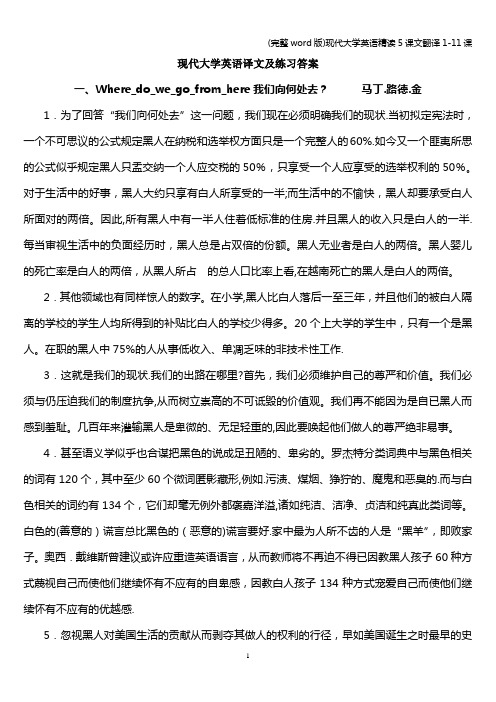
现代大学英语译文及练习答案一、Where_do_we_go_from_here我们向何处去?马丁.路德.金1.为了回答“我们向何处去”这一问题,我们现在必须明确我们的现状.当初拟定宪法时,一个不可思议的公式规定黑人在纳税和选举权方面只是一个完整人的60%.如今又一个匪夷所思的公式似乎规定黑人只盂交纳一个人应交税的50%,只享受一个人应享受的选举权利的50%。
对于生活中的好事,黑人大约只享有白人所享受的一半;而生活中的不愉快,黑人却要承受白人所面对的两倍。
因此,所有黑人中有一半人住着低标准的住房.并且黑人的收入只是白人的一半.每当审视生活中的负面经历时,黑人总是占双倍的份额。
黑人无业者是白人的两倍。
黑人婴儿的死亡率是白人的两倍,从黑人所占的总人口比率上看,在越南死亡的黑人是白人的两倍。
2.其他领域也有同样惊人的数字。
在小学,黑人比白人落后一至三年,并且他们的被白人隔离的学校的学生人均所得到的补贴比白人的学校少得多。
20个上大学的学生中,只有一个是黑人。
在职的黑人中75%的人从事低收入、单凋乏味的非技术性工作.3.这就是我们的现状.我们的出路在哪里?首先,我们必须维护自己的尊严和价值。
我们必须与仍压迫我们的制度抗争,从而树立崇高的不可诋毁的价值观。
我们再不能因为是自已黑人而感到羞耻。
几百年来灌输黑人是卑微的、无足轻重的,因此要唤起他们做人的尊严绝非易事。
4.甚至语义学似乎也合谋把黑色的说成足丑陋的、卑劣的。
罗杰特分类词典中与黑色相关的词有120个,其中至少60个微词匿影藏形,例如.污渍、煤烟、狰狞的、魔鬼和恶臭的.而与白色相关的词约有134个,它们却毫无例外都褒嘉洋溢,诸如纯洁、洁净、贞洁和纯真此类词等。
白色的(善意的)谎言总比黑色的(恶意的)谎言要好.家中最为人所不齿的人是“黑羊”,即败家子。
奥西.戴维斯曾建议或许应重造英语语言,从而教师将不再迫不得已因教黑人孩子60种方式蔑视自己而使他们继续怀有不应有的自卑感,因教白人孩子134种方式宠爱自己而使他们继续怀有不应有的优越感.5.忽视黑人对美国生活的贡献从而剥夺其做人的权利的行径,早如美国诞生之时最早的史书所记,近如每日晨报所载,已有近200年之久。
大学英语精读第五册课文翻译

大学英语精读第五册(第三版)课文翻译Unit1《一番说教》一番说教也许老师比学生更容易理解,为什么学生在掌握了英语基本结构和句型后英语学习反而变得越来越困难了。
学生们自然感到惊奇并失望地发现本来应该变得越来越容易的学习过程却完全不是那么回事。
学生们并不感到多少安慰,在知道老师在其努力所产生的效果似乎不及一开始明显也会灰心丧气。
他发现那些学生很容易去教,为他们能把所学的知识很快的用于实践。
可现在,他们却面对前阶段中从未学过的大量生词,惯用法显得踌躇不前。
他看到学生们在艰难地努力着,因为他们以前认为已经认识的语言现在似乎充满了令人头昏眼花的成语,陈旧用语以及在不同上下文中有不同含义的惯用词组。
要想让他们相信他们仍朝着精通的方向发展,他们英语就一定提高是很困难的。
并且,只要肯花时间和持之以恒。
有些学生在此情况下厌恶地放弃了学习,这并不出人意外;同时,另一些学生仍然充满希望地盼着老师象开始时那样给他们以满怀信心的指导。
从教师这方面看,由于往往不得不去讲解一些无法说清楚的东西,他常常会对同事们引用一些谚语权充台阶,比如:你能牵马河边走,马不饮水你自愁,或说得比较尊重对方但语法并不严谨:倒不在乎说什么,关键瞧您怎么说。
他的学生则会反唇相讥道:我越学越糊涂。
事实当然并非如此。
师生们正体验着一种共识,即学习中遇到的较复杂的语言结构在表达思想中并非至关重要,因此也就少有可能立刻派上用场。
出于同样的理由,在老师看来,恰当地选择教材变得更困难了。
任选一种食品比从品种繁多的菜单上单挑一道在某个特定日子里你想吃的菜要容易多了。
界定问题易于找出答案。
你可建议学生去讲英语的国家住两三年,这等于撒手不管他们。
没有几个学生陪得起时间花得起钱。
常言道:广泛阅读是最佳替代办法,但读书也应有所选择。
让学生走进图书馆随便拿起他们遇到的第一本书就读,这是无用的。
我会这样劝他们;读无需查字典就懂的书(但并非过眼即懂的书),读你感兴趣的书;读时间允许的书(杂志和报纸,而不是长篇小说,除非你能在一周左右读完它);读现在写的文章,而不是二百年前的文章;读得尽量多一些,并尽量记住写作方法,而不要拘泥于令你困惑的个别单词。
现代大学英语精读5+全部课文+背景和段落大意
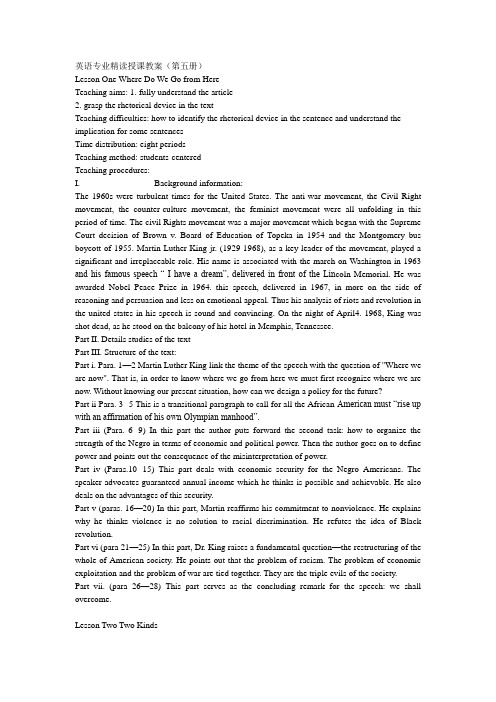
英语专业精读授课教案(第五册)Lesson One Where Do We Go from HereTeaching aims: 1. fully understand the article2. grasp the rhetorical device in the textTeaching difficulties: how to identify the rhetorical device in the sentence and understand the implication for some sentencesTime distribution: eight periodsTeaching method: students-centeredTeaching procedures:I. Background information:The 1960s were turbulent times for the United States. The anti-war movement, the Civil Right movement, the counter-culture movement, the feminist movement were all unfolding in this period of time. The civil Rights movement was a major movement which began with the Supreme Court decision of Brown v. Board of Education of Topeka in 1954 and the Montgomery bus boycott of 1955. Martin Luther King jr. (1929-1968), as a key leader of the movement, played a significant and irreplaceable role. His name is associated with the march on Washington in 1963 and his famous speech ― I have a dream‖, delivered in front of the Lin coln Memorial. He was awarded Nobel Peace Prize in 1964. this speech, delivered in 1967, in more on the side of reasoning and persuasion and less on emotional appeal. Thus his analysis of riots and revolution in the united states in his speech is sound and convincing. On the night of April4. 1968, King was shot dead, as he stood on the balcony of his hotel in Memphis, Tennessee.Part II. Details studies of the textPart III. Structure of the text:Part i. Para. 1—2 Martin Luther King link the theme of the speech with the question of "Where we are now". That is, in order to know where we go from here we must first recognize where we are now. Without knowing our present situation, how can we design a policy for the future?Part ii Para. 3--5 This is a transitional paragraph to call for all the African-American must ―rise up with an affirmation of his own Olympian manhood‖.Part iii (Para. 6--9) In this part the author puts forward the second task: how to organize the strength of the Negro in terms of economic and political power. Then the author goes on to define power and points out the consequence of the misinterpretation of power.Part iv (Paras.10--15) This part deals with economic security for the Negro Americans. The speaker advocates guaranteed annual income which he thinks is possible and achievable. He also deals on the advantages of this security.Part v (paras. 16—20) In this part, Martin reaffirms his commitment to nonviolence. He explains why he thinks violence is no solution to racial discrimination. He refutes the idea of Black revolution.Part vi (para 21—25) In this part, Dr. King raises a fundamental question—the restructuring of the whole of American society. He points out that the problem of racism. The problem of economic exploitation and the problem of war are tied together. They are the triple evils of the society.Part vii. (para 26—28) This part serves as the concluding remark for the speech: we shall overcome.Lesson Two Two KindsTeaching aims: 1. fully understand the article2. present their viewpoint on generation gapTeaching difficulties: how to identify the development of a storyTime distribution: eight periodsTeaching method: students-centeredTeaching procedures:Part I. Background information:The Joy Luck Club, from which ―Two Kinds‖ is taken, explores conflicts between two generations and two different cultures. Set in China and in the United States, the novel is woven by stories of four Chinese mothers and their four daughters. Four Chinese women, who have just arrived in the United States and who are drawn together by the shadow of their past—meet in San Francisco to play mah-jongg, eat dim sum and tell stories. They call their gatherings the Joy Luck Club. While they place high hopes on their daughters, the youger generation think of themselves as Americans and resist their mothers’ attempts to change them into obedient Chinese daughters. Only after they have grown up and become more mature do they realize that the legacy left by their mothers is an important part of their lives, too. The noivel stayed on the best-selling book list of The New York Times for 9 months. A finalist for the national Book Award and the National Book Critics Circle Award, it has been translated into about 20 languages and made into a Hollywood movie.Part II. Detailed Study of the TextPart III. The Structure of the text:Part i (paras.1—3) the beginning part of the story provides the reader with some background information. It tells about the mother and her hopes for her daughter. This paves the way ofr the development of the conflict between the daughter and the mother.Part ii(paras.4—11)this part is about the mother’s unsuccessful attempt to change her daughter into a Chinese Shirley Temple. In the beginning the child was as excited as the mother about becoming a prodigy. At this point, the conflict between mother and daughter was not visible.Part iii(paras12—20) in this part we learn that the mother was trying very hard to train her daughter to be a genius. As the tests got more and more difficult, the daughter lost heart. She decided that she would not let her mother change her. This change of attitudes would lead to the gradual development of the conflict.Part iv (paras 21—28) while watching a Chinese girl playing the piano on an Ed Sullivan Show, a new idea flashed into the mother’s head. With the new plan introduced, the ocnflict would develop further.Part v (paras 29—46) it tells about how the girl was made to learn the piano under the instructions of Old Chong. The relationship between mother and daughter was getting more and more tense.Part vi (para.47—60) Jing-mei was to perform in a talent show held in the church. Jing-mei started all right and soon made a mess of her performance. Undoubtedly this was a heavy blow to her mother. The crisis of the story is about to come.Part vii (para 61—76) the girl assumed that her failure at the show meant she would never have to play the paino. Yet two days later her mother urged her to practice as usual. She refused and the mother insisted. They had the most fierce quarrel they had ever had. This is the crisis or climax of the story.Part viii( 77—93) this concluding part is narrated from a different point of view. Now thedaughter had grown up form a little girl to a mature woman.Part IV. Discussion about generation gap.Part V. Complete the exercises of the text.A report about generation gapLesson ThreeGoods Move. People Move. Ideas Move. And Cultures Change.Teaching aims: 1. fully understand the article2. How to develop an argumentTeaching difficulties: how to develop an argumentTime distribution: eight periodsTeaching method: students-centeredTeaching procedures:Part I. Lead-in : Globalization has become one of those words with the highest frequency of appearance but at the same time it is also a most controversial issue in terms of content, implication and consequence. Since the early 1990s, globalization has developed rapidly and brought great changes to the world. However, groups of people for various reasons oppose globalization and point to the negative effects of globalization. So when we face an article of such an important and sensitive issue, we are apt to ask:What is the author’s attitude towards globalization? What makes her adopt such an attitude? How does she present her argument?Part II. Detailed study of the textPart III. Structure of the textPart i (para 1—3) Globalization is a reality but it is not something complietly new. What is new is the speed and scope of changes.Part ii (para 4—6) this part deals with different views on globalization.Part iii (para 7—9) three points are made in this part:a. Westernization is not a straight road to hell, or to paradise either.b. Cultures are as resourceful, resilient, and unpredictable as the people who compose them.c. Teenagers are one of the powerful engines of merging global cultures.Part iv (para 10—13) this part tells of the author’s experience with Amanda Freeman.Part v (para 14—19) in order to prove fusion is the trend, the author used Tom Soper and mah-jongg as an example.Part vi(para 20—24) this part describes the cultural trends in Shanghai.Part viii( para25—28) the author used the experience at Shanghai Theatre Academy to illustrate the point that the change is at the level of ideas.Part ix (para 29—34)the author in this part introduced Toffler’s view on conflict, change and world order.Part x (para35—36)the main idea is there will not be a uniform world culture in the future; the cultures will coexist and transform each other.Part xii(37—39) the author again used an example in Shanghai to illustrate the transformation of culture.Part IV. Complete the exercises in the textbookPart V. collect their viewpoints about attitude towards globalization.Lesson FourProfessions for WomenTeaching aims: 1. fully understand the article2. grasp the rhetorical device in the textTeaching difficulties: how to understand the poetic and symbolic sentences in the articleTime distribution: eight periodsTeaching method: students-centeredTeaching procedures:Part I. Background information:Virginia Woolf is generally regarded as one of the greatest writers of modernism as well as one of the pioneers of women’s liberation from patriarchy. She is known for her experimentation and innovation in novel writing. In her novel, emphasis is on the psychological realm of her characters and the moment-by-moment experience of living, which are depicted by the techniques of interior monologue and stream of consciousness. In this essay, Virginia Woolf gives a clear and convincing presentation of the obstacles facing professional women.Part II. Detailed study of the textPart III. General analysis of the textPara 1: In the profession of literature, the author finds that there are fewer experiences peculiar to women than in other profession because many women writers before her have made the road smooth.Para 2: the author responds to the host’s suggestion that she should tell the audience something about her own professional experiences. So she now tells her own story –how she became a book reviewer when she was a girl.Para 3.the speaker focuses on the first obstacle to becoming a professional women writer. She uses a figure of speech ―killing the Angel in the House‖ in describing her determination to get ri d of the conventional role of women in her writing.Para 4. after the Angel was dead, the question which remains to be answered is ―what is a woman?‖ it is a transitional link between the quthor’s first and second experience.Paragraph 5. In this paragraph the author talks about her second experience in her profession of literature. As a novelist, she wished to remain "as unconscious as possible" so that nothing might disturb or disquiet the imagination. But she was faced with the conflict between her own approach to art and the conventional approach expected of her by male critics. She believed that sex-consciousness was a great hindrance to women's writing. To illustrate this point, she employs a second figure of speech, "the image of a fisherman lying sunk in dreams on the verge of a deep lake."Para 6. This paragraph sums up the author's two experiences, pointing out that the second obstacle is more difficult to overcome than the first. Women have many prejudices to overcome in the profession of literature and especially in new professions that women are entering.Para.7. In this last paragraph Woolf concludes her speech by raising some important questions concerning the new role of women and the new relationship between men and women.Part IV. Complete the exercise of the textPart V. a report on the professional women in ChinaLesson FiveLove Is a FallacyTeaching aims: 1. fully understand the article2. grasp the rhetorical device in the textTeaching difficulties: how to identify the rhetorical device in the sentence and understand the implication for some sentencesTime distribution: eight periodsTeaching method: students-centeredTeaching procedures:Part I. Lead-in:This is a humorous essay in which the narrator tells his failure to win the heart of a young woman with the force of logic, which therefore proves to him that "love is a fallacy"--"it is inconsistent with logic."Part II. Detailed study of the textPart III. Question on Appreciation:1.How did the narrator describe himself? What does it show? How does the author bring out the pomposity of the narrator? What makes the satire humorous?2.why was the narrator interested in Polly Espy? What kind of girl was she.3. How did the narrator's first date with Polly Espy go?4. How does the language used by Polly strike you? Find some examples from the text and explain what effect her language creates.5. Why did the narrator teach Polly Espy logic? Did he succeed?6. Did the narrator love Polly Espy? How did he try to "acquaint her with his feeling"?7. How did Polly respond to the narrator's arguments for going steady with her? Why did she reject him? What does it show? As the story progresses, Polly turned out to be smarter than the narrator had previously thought. How does this contrast contribute to the humor of the piece? Part IV complete the exercise in the textLesson SixLife Beyond EarthTeaching aims: 1. fully understand the article2. learn to analyze the textTeaching difficulties: how to learn to analyze the text and understand the implication for some sentencesTime distribution: eight periodsTeaching method: students-centeredTeaching procedures:Part I. General introduction:The author deals with recent developments in the search for alien organisms. He discusses various arguments about alien civilization. He does not think that such belief and search is irrational or even crazy. He writes that most people with such belief ―operate from the same instinct, which is to know the truth about the universe‖. At the same time he maintains a scientific attitude, pointing out that although there are many persuasive arguments, there is still no hard evidence to prove the existence of alien life. Yet he does not stop there. He further points out that since the world we live in—the only inhabitable world in the universe so far—is still far from perfect, people in the world need to direct more energy to making it better. Life on Earth is his greater concern.Part II. Detailed study of the text:Part III. Organization of the piece:1. Analysis of the text:(1) Paras. 1--2 the emergence of life(2) Para. 3 (transition) What else is alive out(3) Paras. 4--10 search for life(4) Paras. 11--23 search for intelligence(5) Paras. 24--42 Mars.(6) Paras. 43--45 Dyson's argument(7) Paras. 46--52 conclusion2. Questions to discuss:1) What do you think of the opening paragraph? Does the author begin the article in a forceful way?2)What role does this paragraph play? What is meant by "the enveloping nebula of uncertainties"? What is the contrast involved as imroduced by "despite"?3) What new idea is introduced in Paras. 17--19?4) Comment on the first sentence in Paragraph 21.5) Comment on the role of Paragraph 35.6) What is the conclusion of the author? What would the author expect of people investigating extraterrestrial life?Lesson SevenInvisible ManTeaching aims: 1. fully understand the article2. grasp the implied meaning of some sentencesTeaching difficulties: how to identify the implied meaning in the sentenceTime distribution: eight periodsTeaching method: students-centeredTeaching procedures:Part I. Background Information:1. about the author2. about the articlePart II. Detailed study of the textPart III. Analysis of the text:Para 1. From this opening paragraph we readers can learn a number of important things:(l) By saying "It goes a long way back, some twenty years," the author tells us that the story took place in the past.(2) The "I' here is the narrator, not the author, of the story, and the author is using the first-person narration in telling the story. As we read On, we will find this narrator is also the main character, the protagonist, of the story.(3) Words like "I was looking for myself" and "I am nobody but myself" point out the central theme of the novel--searching for self-identity.Para. 2 This paragraph tells us a bit about the historical background against place. It also introduces a new character--the narrator's grandfather. On his deathbed, he said something that alarmed and puzzled the whole family.Para 3 This paragraph is about the tremendous effect of the grandfather's words upon the narrator, Those words became a constant puzzle for him. As the old man said these words ironically, the boy couldn't understand him. Although the grandfather did not appear in the battleroyal scene or any other events in the rest of the book, his words haunted the narrator at every important moment in his life.Para 4 It tells us about the setting of the battle royal. The narrator was to give his speech at a smoker in a leading hotel in the town. The time is round 1950, the place is a hotel in a Southern town, and the occasion is a gathering of the leading white men of the town. Bearing these in mind will help us readers understand why things happened that way and what was the meaning of all this.Para. 5 Besides giving more details about the place, this paragraph introduces the people involved in the incident the town's big shots, who were "wolfing down the buffet food, drinking beer and whisky and smoking black cigars," and the other black boys who were to take part, who were "tough guys".Para 6 to 9 The main body of the battle royal incident is from Paragraph 4 to paragraph 9. It can be further divided into 4 subsections: the naked white girl's dance; the fight itself; the grabbing for the prize money; the narrator's speech. Paragraphs 6 to 9 form the first subsection in which the author describes the white girl's dance.Paras. 10--28 They form the second subsection of the battle royal incident violent and brutal fight itself. Pay attention to the use of specific words narration realistic and vivid.Paras. 29--46 They describe how the white men further humiliated the black boys even after the battle royal was over. Instead of giving the money the boys were supposed to get for their performance, the white men made fun of them by making them scramble for the money on an electrified rug. This part adds to the general chaos of the whole scene.Para 47--90 They form the last subsection of the whole battle royal incident. In this part the narrator finally got his chance to deliver his well-prepared speech. However, in the middle of his speech, he made a mistake, but everything went well in the end and he was given an award--a scholarship for college.Para. 91—94 They bring the story to a final end. The narrator was overjoyed with his triumph, and that night he dreamed of his grandfather and awoke with the old man’s laughter rining in his ears.Part IV. Complete the exercise in the textPart V. Do some translation work.Lesson EightThe Merely Very GoodTeaching aims: 1. fully understand the article2. grasp the development of the textTeaching difficulties: how to analyze the development of the article and the implied meaning for some sentencesTime distribution: eight periodsTeaching method: students-centeredTeaching procedures:Part I. Information on the author:Jeremy Bernstein(1929- ): professor of physics and writer. After getting his Ph. D. in physics at Harvard, he spent time at the institute for advanced study in Princeton and at the National Science Foundation. He taught physics for 5years at New York University and then at Stevens Institute of Technology, Hoboken, New Jersey.But Jeremy Bernstein has also spent more than 30 years on the staff of The New Yorker magazine, writing mostly about physics, computers, and other topics in physical science. He moves as comfortably among sentences and paragraphs as among equations.Part II. Detailed study of the text:Part III. Questions about the article1. Oppenteimer is called ― Father of the Atomic Bomb‖ and had been in charge of the Los Alamas nuclear laboratory for many years. Yet the author considers him as merely very good. Do you think the author is right and fair in relegating Oppenheimer to the merely very good?2. Do you think it is right to say to be highly focused or not is the cause separating the great ones from the merely very good? What is your view?3. How does the author manage to bring the people he wants to compare into the article?Oppenheimer’s anecdote: Oppenheimer and dirac meetingGottingen, talking about poetry and physicsHis decision to go to the conferenceSpender’s being at the conference—Spender’s obsession with Auden—great versus merely very good.4.How does the author develop the article?He uses the 1981 conference as the benchmark and goes back to earlier times and in the last two paragraphs returns the scene to the time of writing. This technique of montage is used largely in cinema.For example:The 1981 conference and the author’s indecision—(flashback to 1925—1927) earlier life of Oppenheimer and his relations with Dirac—(back to 1981) the author’s decision: Spender and Auden—(flashback)Spender and Oppenheimer(1956)—(1958)Oppenheimer, Dirac and the author—(back to 1981) meeting with Spender—(bringing the scene to 1996) concluding remarks. Lesson NineThe Way to Rainy MountainTeaching aims: 1. fully understand the article2. grasp the rhetorical device in the textTeaching difficulties: how to identify the rhetorical device in the sentence and understand the implication for some sentencesTime distribution: eight periodsTeaching method: students-centeredTeaching procedures:Part I. About the AuthorN. Scott Momaday was born in Lawton, Oklahoma in 1934. Momaday belongs to a generation of American Indians born when most tribal communities had long ceased to exist as vital social organizations. His Kiowa ancestors shared with other Plains Indians the horrors of disease, military defeat, and cultural and religious deprivation in the 19th century. Their only chance of survival was to adapt themselves to new circumstances. Momaday’s grandfather, for example, adjusted to changing conditions by taking up farming, a decision pressed upon him by the General Allotment Act of 1887.Part II. Detailed study of the textPart III. The analysis of the textPara 1. the opening paragraph of the essay is a lyrical description of the author’s ancestral land, which plays a key role in his exploration of his Kiowa identity.Para 2. the author explains his purpose of his visit to Rainy Mountain: to be at his grandmother’s grave.Para 3. it sums up the history of the Kiowas as a Plains Native culture—the golden time and the decline in their history.Para 4. it is about how the Kiowas migrated from western Montana and how the migration transformed the Kiowas.Para 5. the author returns to his grandmother again. Since she is the immediate reason for him to come to Rainy Mountain, she is the link between the author and his ancestors.Para 6. The Kiowas felt a sense of confinement in Yellowstone, Montana.Para 7. this paragraph is a depiction of the landscape which they came upon when they got out of the highlands in Montana.Para 8. in this para the aut hor describes Devil’s Tower and tells the Kiowas’s legend about it.Para 9. the author tells about the last days of the Sun Dance culture by using his grandmother as a witness.Para 10. for the first time, the author concentrates only on his grandmother’s story rather than mixing it with the history of the whole Kiowa tribe. Also for the first time, the author shifts the focus of depicting the lanscape to describing a person—his grandmother Aho as an old woman. Para 11—12 paragraph 11 is about the old house s at Rainy Mountain, which the author’s grandmother and other Kiowas used to live in, but which are now empty. This paragraph serves as a transition between the depiction of Grandma Aho and the reunion at her house.Para 11 and 12 describe the reunions tha t were once held at the grandmother’s house when the author was a child. We can see the author accepts change and loss as facts of life. He neither denies nor defies them. Imagination helps him strike a balance between them. So, after depicting his dead gr andmother’s old house, he brings to life the joy and activity that once filled it. As a child Momaday took part in those events. By re-creating those scenes, he reminds himself of who he is.Part IV. Complete the exercise of the text。
大学英语精读第5册课文全文翻译
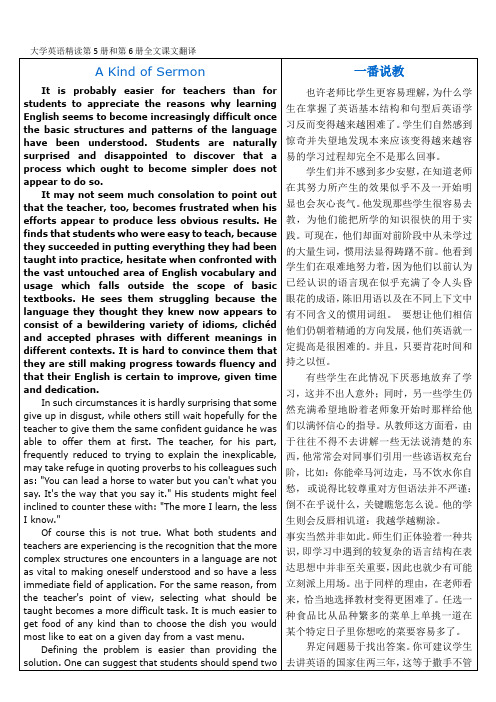
《现代大学英语精读5》课后句子翻译Lesson1-5
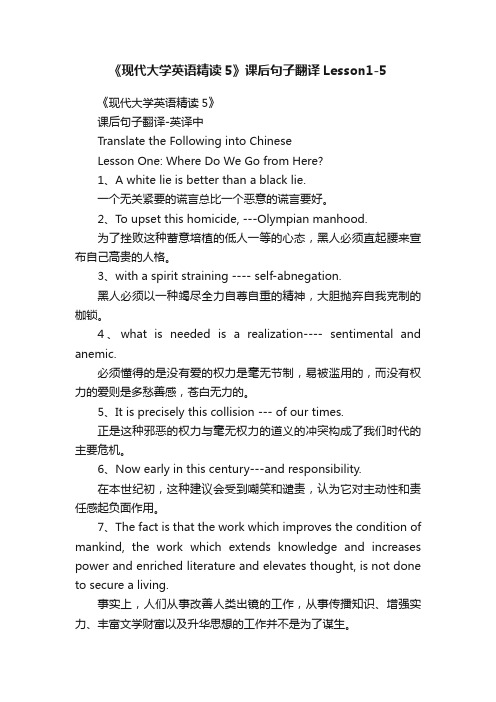
《现代大学英语精读5》课后句子翻译Lesson1-5《现代大学英语精读5》课后句子翻译-英译中Translate the Following into ChineseLesson One: Where Do We Go from Here?1、A white lie is better than a black lie.一个无关紧要的谎言总比一个恶意的谎言要好。
2、To upset this homicide, ---Olympian manhood.为了挫败这种蓄意培植的低人一等的心态,黑人必须直起腰来宣布自己高贵的人格。
3、with a spirit straining ---- self-abnegation.黑人必须以一种竭尽全力自尊自重的精神,大胆抛弃自我克制的枷锁。
4、what is needed is a realization---- sentimental and anemic.必须懂得的是没有爱的权力是毫无节制,易被滥用的,而没有权力的爱则是多愁善感,苍白无力的。
5、It is precisely this collision --- of our times.正是这种邪恶的权力与毫无权力的道义的冲突构成了我们时代的主要危机。
6、Now early in this century---and responsibility.在本世纪初,这种建议会受到嘲笑和谴责,认为它对主动性和责任感起负面作用。
7、The fact is that the work which improves the condition of mankind, the work which extends knowledge and increases power and enriched literature and elevates thought, is not done to secure a living.事实上,人们从事改善人类出镜的工作,从事传播知识、增强实力、丰富文学财富以及升华思想的工作并不是为了谋生。
(完整word版)现代大学英语精读5课后翻译
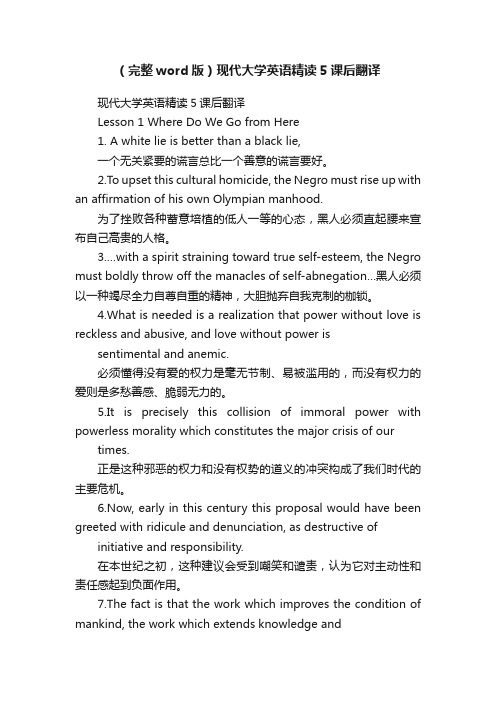
(完整word版)现代大学英语精读5课后翻译现代大学英语精读5课后翻译Lesson 1 Where Do We Go from Here1. A white lie is better than a black lie,一个无关紧要的谎言总比一个善意的谎言要好。
2.To upset this cultural homicide, the Negro must rise up with an affirmation of his own Olympian manhood.为了挫败各种蓄意培植的低人一等的心态,黑人必须直起腰来宣布自己高贵的人格。
3.…with a spirit straining toward true self-esteem, the Negro must boldly throw off the manacles of self-abnegation…黑人必须以一种竭尽全力自尊自重的精神,大胆抛弃自我克制的枷锁。
4.What is needed is a realization that power without love is reckless and abusive, and love without power issentimental and anemic.必须懂得没有爱的权力是毫无节制、易被滥用的,而没有权力的爱则是多愁善感、脆弱无力的。
5.It is precisely this collision of immoral power with powerless morality which constitutes the major crisis of our times.正是这种邪恶的权力和没有权势的道义的冲突构成了我们时代的主要危机。
6.Now, early in this century this proposal would have been greeted with ridicule and denunciation, as destructive of initiative and responsibility.在本世纪之初,这种建议会受到嘲笑和谴责,认为它对主动性和责任感起到负面作用。
现代大学英语精读5课文翻译。。

.一座孤零零的小山在俄克拉荷马的草原上拔地而起,它的西面和北面是维奇塔山脉。
对于我们克尔瓦人来说,它是个古老的界标,我们给它取名叫雨山。
这里有世界上最恶劣的天气。
冬季有大暴风雪,春季就刮起了飓风,到了夏季,草原热得就像铁砧一样。
草变得又脆又黄。
沿着河流和小溪,是长长的绿带,有一排排的山核桃树、柳树和金缕梅。
从远望去,七八月里的树叶热得冒烟,犹如在火中挣扎。
高高的草地上到处都是大个儿的黄绿色的蚱蜢.像玉米花一样爆裂开,刺得人痛。
乌龟在红土地上爬行,不知要去何处。
寂寞荒凉是这里的一大特点。
草原上的一切都是疏离开来的,所见之物不会混杂在一起让人看不清楚。
要么只是一山,要么只是一树、一人。
清晨,太阳在你的背后冉冉升起,此时观看大地,你会失去平时的比例感。
你会张开想像的翅膀,并认定这就是上帝造设宇宙的起始点。
2.我七月回到了雨山。
我祖母于春季去世,我是想去她的墓地。
她活得很老,最后因虚弱而死。
她死的时候,是她现在惟一活着的女儿陪伴着她。
听说她死时的脸像张孩子的脸。
3.我喜欢把她看作孩子。
她出生时,俄克拉荷马人正生活在其所史上鼎盛时期的最后阶段。
一个多世纪以来,他们掌控着从斯莫克山河到红河那片空旷的山脉,掌控着从加拿大河流的源头到阿肯色河和西马隆河交汇处的地域。
他们与科曼斯人一道,统治着整个南部平原。
发动战争是他们神圣的职责.他们是世人所知的最优秀的骑手。
然而,对于克尔瓦人来说,作战更多是因为这是他们的习惯,而非为了生存。
他们从来都不理解美国骑兵残酷的进攻。
当最后四分五裂、弹尽粮绝时,他们便冒着冰凉的秋雨来到斯代克特平原,陷入了恐慌。
在帕罗多罗坎,他们的弹粮被抢劫一空,只剩下了性命。
为了拯救自己,他们在福特西尔投降,被监禁在一个石头堆砌的牛马棚。
现在,这里已经是个军事博物馆了。
我的祖母得以豁免那高高的灰墙里的羞辱,因为她是在此事件8年或10年后出生的。
但自出生起,她就已经懂得失败给人带来的苦难.这使那些老战士们百思不得其解。
现代大学英语精读5 Unit 2,3,4,6,7 课后翻译

课后翻译Lesson 21.Instead of getting big fat curls,I emerged with an uneven mass ofcrinkly black fuzz.我的头发没有做出我要的大卷花,而是给我弄成一头乱蓬蓬的黑色小卷毛.2.She checked to see if that might be one way to pronounce “Helsinki”before showing me the answer.在她告诉我答案前, 她对了对手中的杂志,看看赫尔辛基是否能这样发音。
3.She seemed entranced by the music, a frenzied little piano piece witha mesmerizing quality, sort of quick passages and then teasing liltingones before it returned to the quick playful parts.她似乎被这音乐吸引住了。
这钢琴曲不长, 但有点狂乱,有着迷人的特点,乐曲一开始时快节奏的,接着是欢快跳动的节拍,然后又回到嬉戏的部分。
4.If she had as much talent as she had temper, she would be famousnow。
如果她的才气和她的脾气一样大,她早就出名了。
5.The part I liked to practice best was the fancy curtsy:right foot out,touch the rose on the carpet with a pointed foot,sweep to the side,bend left leg,look up, and smile.我最喜欢练习的部分是花哨的谢幕行礼的动作:先出右脚,脚尖点在地毯的玫瑰图案上,身子侧摆,左腿弯曲,抬头,微笑。
现代大学英语精读5 Before_and_After_September_11课文翻译 译文

“9. 11”事件前后泰?摩西As the ruins of the World Trade Towers smoldered at the southern end of Manhattan and the breeze stirred the ashes of thousands of human beings, a new age of anxiety was born. If someone had slept through September 11 and awakened, Rip Van Winkle-like today, he would open his eyes on an astonishing new landscape.1.世贸大厦双塔的废墟还在曼哈顿区南端闷燃,微风将几千人的身躯化成的灰烬吹起,一个新的焦虑时代由此开始。
如果有人在9月11日那天像瑞普?凡?温克尔那样恰好睡去,一觉醒来,眼前的这一派景象定让他瞠日结舌。
Guardsmen toting M-16s are stationed at our airports. The president of the United States attends a World Series game and the airspace over Yankee Stadium is closed, a line of snipers positioned on the stadium rooftop. The vice-president's safekeepers whisk him from place to place, just as his arch-nemesis Osama bin Laden is presumably moved from cave to cave halfway across the world. Anthrax panic sends Congress running from its chambers.2.机场里驻进了背着V-16自动步枪的国民警卫队员。
最新-现代大学英语精读5课文翻译详解1 精品
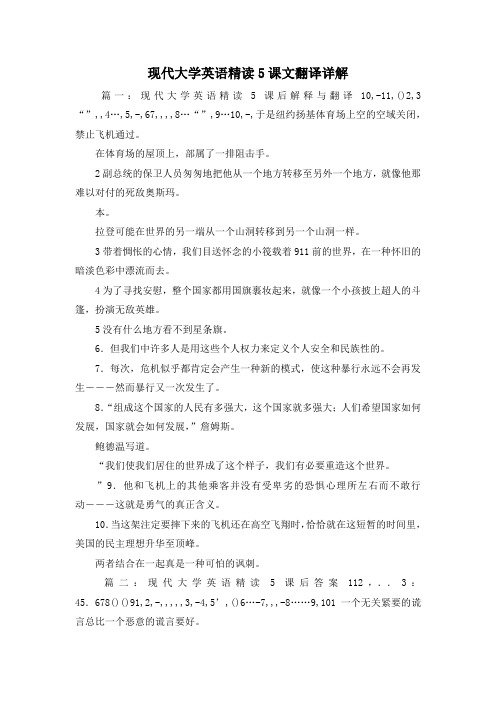
现代大学英语精读5课文翻译详解
篇一:现代大学英语精读5课后解释与翻译10,-11,()2,3“”,,4…,5,-,67,,,,8…“”,9…10,-,于是纽约扬基体育场上空的空域关闭,禁止飞机通过。
在体育场的屋顶上,部属了一排阻击手。
2副总统的保卫人员匆匆地把他从一个地方转移至另外一个地方,就像他那难以对付的死敌奥斯玛。
本。
拉登可能在世界的另一端从一个山洞转移到另一个山洞一样。
3带着惆怅的心情,我们目送怀念的小筏载着911前的世界,在一种怀旧的暗淡色彩中漂流而去。
4为了寻找安慰,整个国家都用国旗裹妆起来,就像一个小孩披上超人的斗篷,扮演无敌英雄。
5没有什么地方看不到星条旗。
6.但我们中许多人是用这些个人权力来定义个人安全和民族性的。
7.每次,危机似乎都肯定会产生一种新的模式,使这种暴行永远不会再发生―――然而暴行又一次发生了。
8.“组成这个国家的人民有多强大,这个国家就多强大;人们希望国家如何发展,国家就会如何发展,”詹姆斯。
鲍德温写道。
“我们使我们居住的世界成了这个样子,我们有必要重造这个世界。
”9.他和飞机上的其他乘客并没有受卑劣的恐惧心理所左右而不敢行动―――这就是勇气的真正含义。
10.当这架注定要摔下来的飞机还在高空飞翔时,恰恰就在这短暂的时间里,美国的民主理想升华至顶峰。
两者结合在一起真是一种可怕的讽刺。
篇二:现代大学英语精读5课后答案112,..3:45.678()()91,2,-,,,,,3,-4,5’,()6…-7,,,-8……9,101一个无关紧要的谎言总比一个恶意的谎言要好。
现代大学英语精读5课文翻译详解
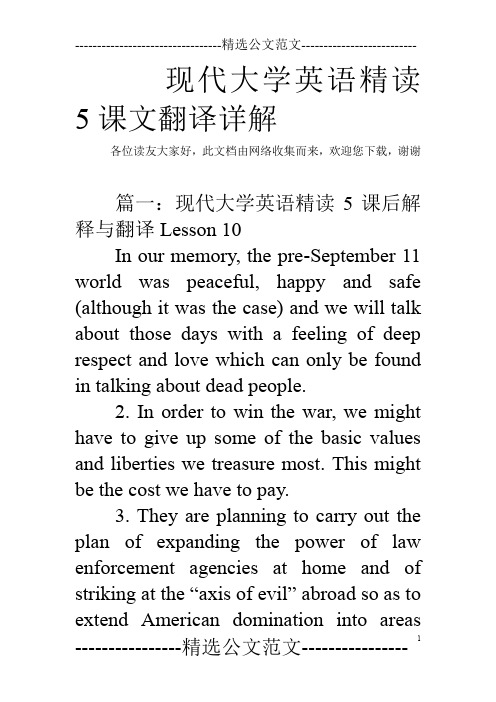
现代大学英语精读5课文翻译详解各位读友大家好,此文档由网络收集而来,欢迎您下载,谢谢篇一:现代大学英语精读5课后解释与翻译Lesson 10In our memory, the pre-September 11 world was peaceful, happy and safe (although it was the case) and we will talk about those days with a feeling of deep respect and love which can only be found in talking about dead people.2. In order to win the war, we might have to give up some of the basic values and liberties we treasure most. This might be the cost we have to pay.3. They are planning to carry out the plan of expanding the power of law enforcement agencies at home and of striking at the “axis of evil” abroad so as to extend American domination into areasoriginally beyond American reach, such as Central Asia. Hence, the colonization of the future.4. … which takes for granted that people think in a simple and uniform way while actually the feelings, thoughts and views of the American people are as varied as America itself.5. The terrorist attacks put us at the bottom of the hierarchy of human needs, trying hard to re-establish our confidence in physical safety, the lowest type of safety.6. We are used to thinking that Western democracies practice rule of law and individual rights and freedom are protected by law. Violation of individual rights and suppression of dissenting voices can only be found in repressive regimes.7. People began to put less emphasis on the pursuit of wealth and possession of worldly goods. And the other twodangerous symptoms that went with materialism, that is physical separation from other and irrational behavior as a result of impulse, also became less serious. Materialism, together with the accompanying symptoms of separation and compulsion, had been the cause of the ruin of community in this country.8. … at a time w hen it is highly important for Americans to look into ourselves and ask ourselves why “they hate us”, this concept directs our attention and thinking away from such analysis.9. … history records many crimes committed by human beings which are so horrible that they defy description.spite of the fact that these images are horrible images, images of large-scale atrocity, we still take care to keep alive these images.于是纽约扬基体育场上空的空域关闭,禁止飞机通过。
现代大学英语精读5第一课中英文对照

现代大学英语精读5第一课中英文对照Martin Luther King Speech - Where do we go from hereNow, in order to answer the question, "Where do we go from here?" which is our theme, we must first honestly recognize where we are now. When the Constitution was written, a strange formula to determine taxes and representation declared that the Negro was 60 percent of a person. Today another curious formula seems to declare he is 50 percent of a person. Of the good things in life, the Negro has approximately one half those of whites. Of the bad things of life, he has twice those of whites. Thus half of all Negroes live in substandard housing. And Negroes have half the income of whites. When we view the negative experiences of life, the Negro has a double share. There are twice as many unemployed.The rate of infant mortality among Negroes is double that of whites and there are twice as many Negroes dying in Vietnam as whites in proportion to their size in the population.现在,为了回答这个问题,“我们该何去何从呢?”是我们的主题,我们首先必须坦白承认我们现在是在什么地方。
现代大学英语精读5课文翻译unit
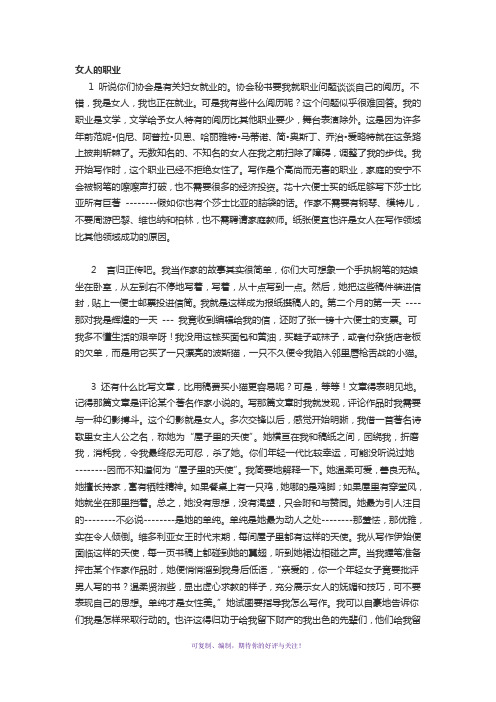
女人的职业1 听说你们协会是有关妇女就业的。
协会秘书要我就职业问题谈谈自己的阅历。
不错,我是女人,我也正在就业。
可是我有些什么阅历呢?这个问题似乎很难回答。
我的职业是文学,文学给予女人特有的阅历比其他职业要少,舞台表演除外。
这是因为许多年前范妮•伯尼、阿普拉•贝恩、哈丽雅特•马蒂诺、简•奥斯丁、乔治•爱略特就在这条路上披荆斩棘了。
无数知名的、不知名的女人在我之前扫除了障碍,调整了我的步伐。
我开始写作时,这个职业已经不拒绝女性了。
写作是个高尚而无害的职业,家庭的安宁不会被钢笔的嚓嚓声打破,也不需要很多的经济投资。
花十六便士买的纸足够写下莎士比亚所有巨著--------假如你也有个莎士比亚的脑袋的话。
作家不需要有钢琴、模特儿,不要周游巴黎、维也纳和柏林,也不需聘请家庭教师。
纸张便宜也许是女人在写作领域比其他领域成功的原因。
2 言归正传吧。
我当作家的故事其实很简单,你们大可想象一个手执钢笔的姑娘坐在卧室,从左到右不停地写着,写着,从十点写到一点。
然后,她把这些稿件装进信封,贴上一便士邮票投进信筒。
我就是这样成为报纸撰稿人的。
第二个月的第一天---- 那对我是辉煌的一天--- 我竟收到编辑给我的信,还附了张一镑十六便士的支票。
可我多不懂生活的艰辛呀!我没用这钱买面包和黄油,买鞋子或袜子,或者付杂货店老板的欠单,而是用它买了一只漂亮的波斯猫,一只不久便令我陷入邻里唇枪舌战的小猫。
3 还有什么比写文章,比用稿费买小猫更容易呢?可是,等等!文章得表明见地。
记得那篇文章是评论某个著名作家小说的。
写那篇文章时我就发现,评论作品时我需要与一种幻影搏斗。
这个幻影就是女人。
多次交锋以后,感觉开始明晰,我借一首著名诗歌里女主人公之名,称她为“屋子里的天使”。
她横亘在我和稿纸之间,困绕我,折磨我,消耗我,令我最终忍无可忍,杀了她。
你们年轻一代比较幸运,可能没听说过她--------因而不知道何为“屋子里的天使”。
我简要地解释一下。
现代大学英语精读5翻译
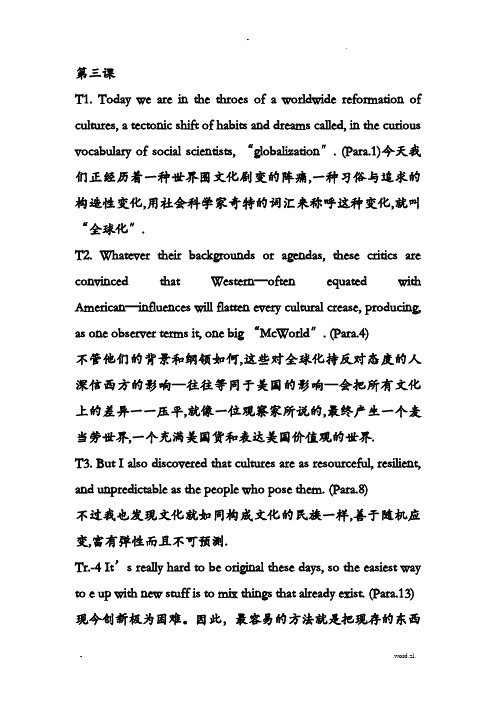
第三课T1. Today we are in the throes of a worldwide reformation of cultures, a tectonic shift of habits and dreams called, in the curious vocabulary of social scientists, “globalization〞. (Para.1)今天我们正经历着一种世界围文化剧变的阵痛,一种习俗与追求的构造性变化,用社会科学家奇特的词汇来称呼这种变化,就叫“全球化〞.T2. Whatever their backgrounds or agendas, these critics are convinced that Western—often equated with American—influences will flatten every cultural crease, producing, as one observer terms it, one big “McWorld〞. (Para.4)不管他们的背景和纲领如何,这些对全球化持反对态度的人深信西方的影响—往往等同于美国的影响—会把所有文化上的差异一一压平,就像一位观察家所说的,最终产生一个麦当劳世界,一个充满美国货和表达美国价值观的世界.T3. But I also discovered that cultures are as resourceful, resilient, and unpredictable as the people who pose them. (Para.8)不过我也发现文化就如同构成文化的民族一样,善于随机应变,富有弹性而且不可预测.Tr.-4 It’s r eally hard to be original these days, so the easiest way to e up with new stuff is to mix things that already exist. (Para.13) 现今创新极为困难。
大学英语精读5课文翻译
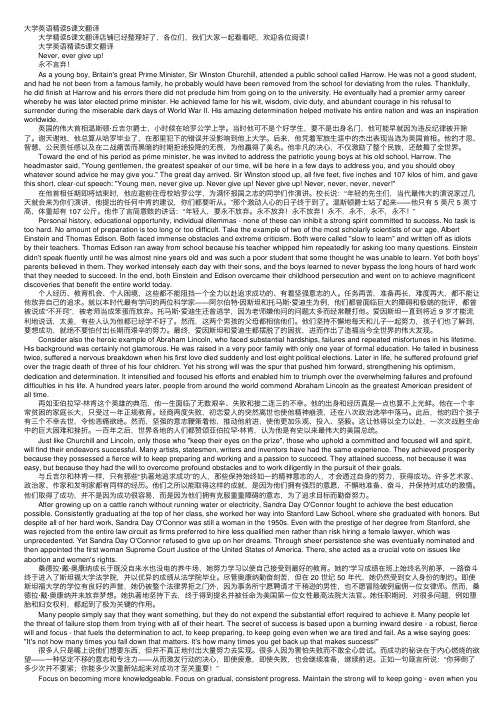
⼤学英语精读5课⽂翻译 ⼤学精读5课⽂翻译店铺已经整理好了,各位们,我们⼤家⼀起看看吧,欢迎各位阅读! ⼤学英语精读5课⽂翻译 Never, ever give up! 永不⾔弃! As a young boy, Britain's great Prime Minister, Sir Winston Churchill, attended a public school called Harrow. He was not a good student, and had he not been from a famous family, he probably would have been removed from the school for deviating from the rules. Thankfully, he did finish at Harrow and his errors there did not preclude him from going on to the university. He eventually had a premier army career whereby he was later elected prime minister. He achieved fame for his wit, wisdom, civic duty, and abundant courage in his refusal to surrender during the miserable dark days of World War II. His amazing determination helped motivate his entire nation and was an inspiration worldwide. 英国的伟⼤⾸相温斯顿·丘吉尔爵⼠,⼩时候在哈罗公学上学。
- 1、下载文档前请自行甄别文档内容的完整性,平台不提供额外的编辑、内容补充、找答案等附加服务。
- 2、"仅部分预览"的文档,不可在线预览部分如存在完整性等问题,可反馈申请退款(可完整预览的文档不适用该条件!)。
- 3、如文档侵犯您的权益,请联系客服反馈,我们会尽快为您处理(人工客服工作时间:9:00-18:30)。
现代大学英语译文及练习答案一、Where_do_we_go_from_here我们向何处去?马丁.路德.金1.为了回答“我们向何处去”这一问题,我们现在必须明确我们的现状。
当初拟定宪法时,一个不可思议的公式规定黑人在纳税和选举权方面只是一个完整人的60%。
如今又一个匪夷所思的公式似乎规定黑人只盂交纳一个人应交税的50%,只享受一个人应享受的选举权利的50%。
对于生活中的好事,黑人大约只享有白人所享受的一半;而生活中的不愉快,黑人却要承受白人所面对的两倍。
因此,所有黑人中有一半人住着低标准的住房。
并且黑人的收入只是白人的一半。
每当审视生活中的负面经历时,黑人总是占双倍的份额。
黑人无业者是白人的两倍。
黑人婴儿的死亡率是白人的两倍,从黑人所占的总人口比率上看,在越南死亡的黑人是白人的两倍。
2.其他领域也有同样惊人的数字。
在小学,黑人比白人落后一至三年,并且他们的被白人隔离的学校的学生人均所得到的补贴比白人的学校少得多。
20个上大学的学生中,只有一个是黑人。
在职的黑人中75%的人从事低收入、单凋乏味的非技术性工作。
3.这就是我们的现状。
我们的出路在哪里?首先,我们必须维护自己的尊严和价值。
我们必须与仍压迫我们的制度抗争,从而树立崇高的不可诋毁的价值观。
我们再不能因为是自已黑人而感到羞耻。
几百年来灌输黑人是卑微的、无足轻重的,因此要唤起他们做人的尊严绝非易事。
4.甚至语义学似乎也合谋把黑色的说成足丑陋的、卑劣的。
罗杰特分类词典中与黑色相关的词有120个,其中至少60个微词匿影藏形,例如。
污渍、煤烟、狰狞的、魔鬼和恶臭的。
而与白色相关的词约有134个,它们却毫无例外都褒嘉洋溢,诸如纯洁、洁净、贞洁和纯真此类词等。
白色的(善意的)谎言总比黑色的(恶意的)谎言要好。
家中最为人所不齿的人是“黑羊”,即败家子。
奥西.戴维斯曾建议或许应重造英语语言,从而教师将不再迫不得已因教黑人孩子60种方式蔑视自己而使他们继续怀有不应有的自卑感,因教白人孩子134种方式宠爱自己而使他们继续怀有不应有的优越感。
5.忽视黑人对美国生活的贡献从而剥夺其做人的权利的行径,早如美国诞生之时最早的史书所记,近如每日晨报所载,已有近200年之久。
为了挫败这种文化封杀,黑人必须奋起申明自己高贵的人格。
任何忽略这一要点的为黑人争取自由的运动都将行色匆匆,行将就木。
只要心灵被奴役.肉体就永远不会得到解放。
心理上的自由,即强烈的自尊感,是战胜肉体受奴役的漫漫长夜最强有力的武器。
林肯的《斛放宣言》和约翰逊的《人权法案》都不能完全带来这种自由。
黑人惟有发自内心并用坚定的人格的笔墨签下解放自己的宣言才会得到解放。
黑人必须竭尽全力以自尊自重的精神大胆抛弃自我否定的枷锁,对自己、对世界说,“我非等闲之辈。
我是人。
我是一个有尊严、有声誉的人。
我有丰富而非凡的历史。
耶是一段多么痛苦的受剥削的经历。
是的,我从祖先那里继承了我的奴隶身份,但我并不为此感到耻辱。
”是的,我们必须站起身来说。
“我是黑人,我因黑而美。
”黑人需要这种自我肯定,而白人对黑人所犯下的罪行使得这种自我肯定更显必要。
6.另一个主要的挑战是在经济和政治上如何增强我们的实力。
毋庸置疑,黑人极其需要这种合法的权力。
其实黑人所面临的一个严峻的问题就是权力匮乏。
从南方的老种植园到北方较新的居留地,黑人一直被迫过着一种无声无息且无权无势的生活。
由于被剥夺了决定自己生活和命运的权利,他们只能对这个白人权力机构做出的专断的、有时是匪夷所思的决定听之任之。
那些种植园和居留地是由掌权的人开辟的,既可限制那些无权的人又可使他们的无权状况延续下去。
因此,改变居留地的问题就是权力的问题 ---要求改变的权力和致力于维持社会现状的权力这两种力量之间的冲突。
对权力的恰当的定义即权力指实现目的的能力。
它意指能引发社会、政治、经济变化所需的力量。
沃尔特.罗依德曾为权力下过定义。
他说,“权力就是像汽车工人联合会这样的工会能使像通用汽车公司这样的世界上最强大的公司想说‘不’时说‘是’的能力。
这就是权力。
”7.现在我们中有许多人是传道者,且我们所有的人都有自己的道德信念和所关心的事,因此经常与权力有冲突。
如果使用得当,权力并没有什么问题。
然而,问题是有些哲学家曲解了它。
历史上的一大问题就是常把爱和权力的概念对立起来 ---把它们看作两极化的对立面---结果爱意味着放弃权力,而权力则意味着对爱的摒弃。
8.正是这种曲解使研究权力欲望的哲学家尼采拒绝基督教的爱的概念,又是这种曲解诱使基督教的神学家们以基督教的爱的思想的名义拒绝尼采的有关权力欲望的哲学。
现在我们必须得把这一曲解改正过来。
这需要认识到没有爱的权力是毫无节制、易被滥用的,而没有权力的爱则是多愁善感、苍白,无力的。
最理想的权力是实现公正所需的爱,最理想的公正是改正任何阻挠爱的权力。
这就是我们走向未来时必须要理解的。
事实表明在我们国家我们曾对此有过误解及模糊认识.并因此导致了美国黑人试图用没有爱和良知的权力实现他们的目标。
9.这使得今天为数不多的极端分子倡导黑人应从白人手中谋求夺取他们曾深恶痛绝的毁灭性的、无良知的权力。
正是这种不道德的权力和毫无权力的道德的冲突导致了我们这个时代的主要危机。
lO.我们必须制定计划推动我们国家实现有保障的年收入。
倘若是在本世纪初提出,这种建议或许会因为有损主动性和责任感而受到嘲笑和谴责。
当时经济地位被看作是衡量一个人的能力和才能的标准。
因此以那时的衡量标准,财物匮乏表明缺少勤劳的习惯和是非观念。
在对人的动机和我们的经济体制无序运作的理解上,我们已取得了很大的进步。
现在我们懂得是我们的经济市场运行混乱、歧视盛行才使得人们无所事事,从而使他们违背自己的意愿长期失业或不断失业。
今天,我希望出于良知,穷人将不再像从前那样因被标榜为卑微或无能而常常被解雇。
我们还必须懂得无论经济如何快速发展都无法消除一切贫困。
11.这一问题表明我们的工作重点必须是双重的。
我们既要提供全面就业又要创收。
无论如何,要想尽一切办法使人们成为消费者。
一但他们处于这样的位置,我们就必须关注个人的潜力不被浪费。
我们应为那些找不到传统工作的人开拓新的对社会有益的工作。
1879年亨利·乔治在他所著的《进步与贫穷》一书中就预见了这样的事态。
12.事实上,人们从事改善人类处境的工作,从事传播知识、增强实力、丰富文学财富以及升华思想的工作并不是为了谋生。
这与奴隶被迫做工有所不同。
奴隶做工不是被任务本身或工头所迫就是出于动物本能,而这种工作是它本身能为生活带来保障,并创造一种消除了匮乏的社会形态。
13.倘使能大规模地增加这种工作,我们可能会发现如果把住房和教育放在消除贫困之后,那么住房和教育问题会随着贫穷的消除而有所改善。
被改造成消费者的穷人会依靠自已的力量大举改善其恶劣的住房状况。
当有了额外的金钱这一武器,饱尝贫穷和种族歧视双重痛苦的黑人在他们反歧视的斗争中将会收到更大的成效。
14.此外,广泛的经济保障必然会带来许多积极的心理上的改变。
当命运掌握在自己的手中,并有财力寻求自我提高时,人的尊严就会达到巅峰。
当不再用金钱的天平不公正地衡量一个人的价值时,夫妻子女间的冲突就会减少。
15.现在我们的国家有此财力。
约翰·肯尼斯·加尔布来斯说每年只需200亿美元就可以实现有保障的年收入。
今天我想在此告诉你们,如果我们国家一年能花掉350亿美元在越南发动一场不公正的邪恶的战争,200亿美元把人送上月球,那么它就能花费几十亿美元帮助上帝的孩子自立于这个世界。
16.现在,简单地说,我们必须重申我们的非暴力承诺。
我想强凋这一点。
近期所有的黑人骚乱表明暴力在争取种族平等的斗争中是徒劳无益的。
昨天我试图分析这骚乱及其缘由。
今天我想揭示其另一面。
诚然,骚乱总是有些令人悲伤痛苦。
人们经常可以看见尖声大叫着的青年人和愤怒的成年人绝望而盲目地与不可能战胜的困难作战。
然而,在他们内心深处可以看见自我毁灭的欲望,一种自绝于世的渴望。
17.时有黑人争辨说1965年的瓦特骚乱和其他城市的骚乱代表着有效的人权行动,但当问到这些骚乱最终取得了什么具体的收益时,那些持此观点者则支支吾吾、无以应答。
那些骚乱顶多从被吓坏了的政府官员那里得到少量额外的扶贫金和几处给居留地的孩子们降温的喷水设施。
这就像给仍关在铁窗后的人改善监狱的伙食一样。
没有任何骚乱能像有组织的抗议示威那样赢得实实在在的改进。
当试图请提倡暴力者说明什么做法会是有效的时,回答总是明显地不合逻辑。
有时他们谈论颠覆种族政府和地方政府,继而谈论民兵战争。
他们不懂除非政府已失去武装部队的支持和对其有效的控制,没有任何内部革命能够通过暴力成功地推翻政府。
任何有理性的人都明白这在美国是绝不会发生的。
当面临种族暴力的局势时,权力机构可以支配地方警察、州警察、国民警卫队直至军队---所有这些武装大部分是由白人组成的。
此外,除非主张暴力的少数人得到大多数人的同情与支持,不和他们对抗,否则暴力革命很少或者说几乎没有成功的。
尽管卡斯特罗可能实际上只有为数不多的古巴人在山上与他并肩作战,但是倘若他没有得到绝大多数的古巴人民的同情他就绝不可能成功地推翻巴蒂斯塔政权。
18.显而易见.美国黑人的暴力革命不会得到白人甚至大多数黑人的同情和支持。
现在不是进行浪漫的幻想和对自由进行空洞的哲学论辩的时候;现在是行动的时候。
我们需要的是寻求改变的策略,一个能使黑人尽快地融入到美国的主流生活的高明方案。
迄今为止,只有非暴力运动为此提供了可能。
如果不能领悟到这一点,我们就不能真正解释、回答、解决问题。
19.因此今天我想告诉你们我仍坚持非暴力这一原则,因为我仍坚信它是黑人在这个国家争取公正的斗争的最有效的武器。
另外因为我企盼一个更美好的世界。
我企盼公正。
我企盼兄弟情谊。
我企盼真理。
当一个人有此企盼时,他绝不会倡导暴力。
因为暴力可能除掉一个凶手,但却不能消除谋杀。
暴力可能除掉一个骗子,但却不能缔造真理。
暴力可能除掉一个仇人,但却不能消除仇恨。
黑暗不能驱除黑暗,只有光明才能驱除黑暗。
20.我还想告诉你们我已决意继续以爱为本。
因为我知道爱是最终解决人类问题的惟一答案。
因此,无论走到哪里我都会谈及此话题。
我知道今天在某些圈子里这是一个不受欢迎的话题。
我所谈及的爱不是情感纠葛,而是较高层次的强烈的爱。
因为我看到了太多的恨。
在南部县治安官的脸上看到了太多的恨。
在南部太多的三K党人和太多的白人政务会委员的脸上看到了对我的恨。
因为每当我看到这种恨,我知道这对他们的脸和人格都有影响,我会对自己说,恨是一个令人难以承受的负担。
因此我已决意以爱为本。
倘若你在寻求最高层次的德行,我想你可以在爱中找到。
美妙的是当我们这样做时,我们正远离是非,正如约翰所示,上帝就是爱。
心存怨恨的人不识上帝,倒是心中有爱的人最终能够开启通向现实的大门。
